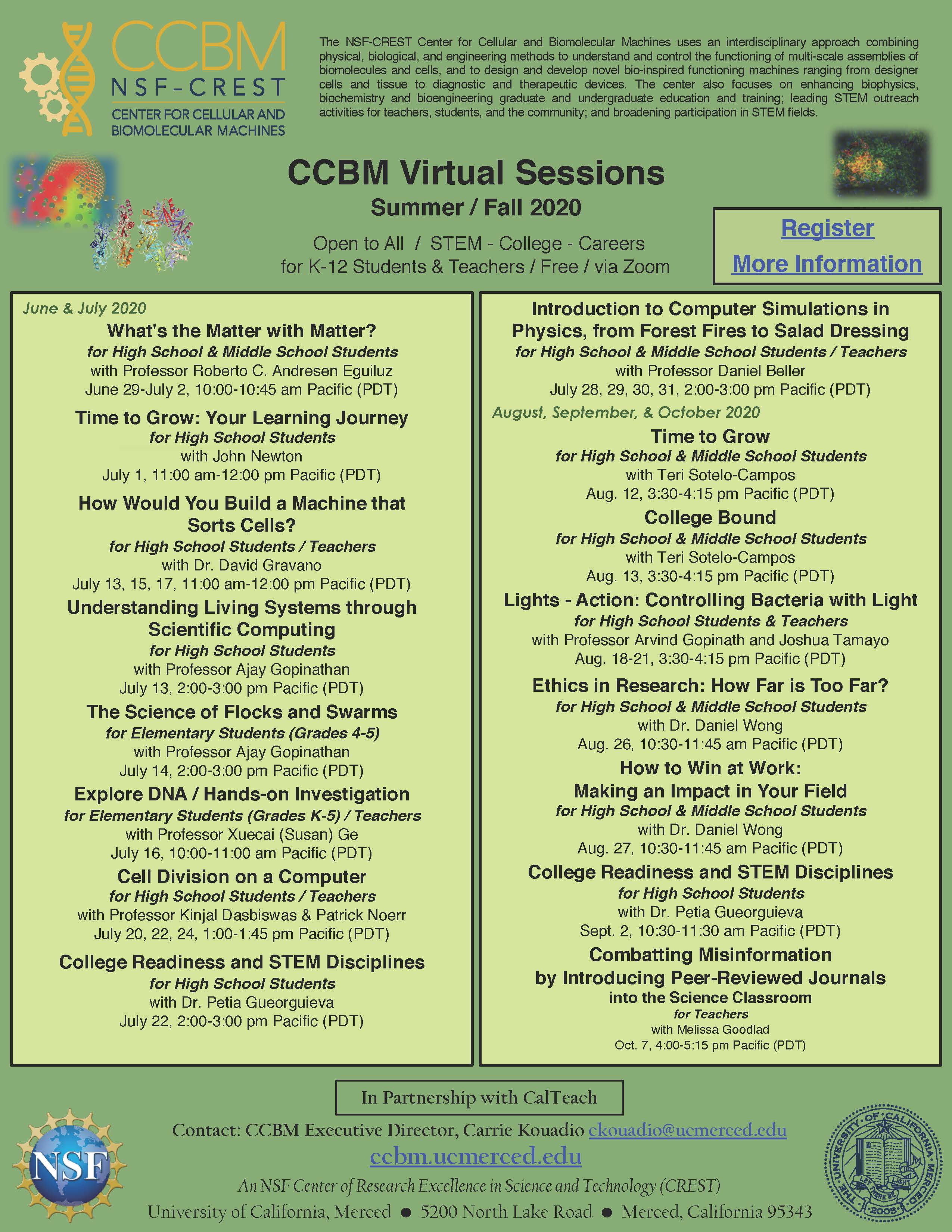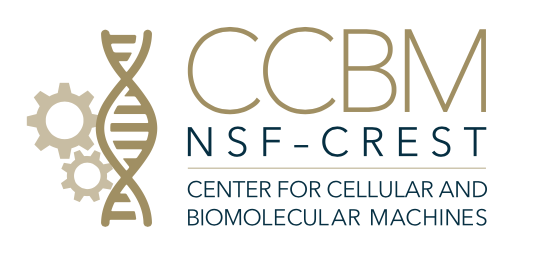Hosted by the NSF-CREST Center for Cellular and Biomolecular Machines at the University of California, Merced
- Open to ALL
- STEM-College-Careers for K-12 Students & Teachers
- Hosted via Zoom
- No cost
CCBM Virtual Sessions
What's the Matter with Matter?
Presented by: Professor Roberto C. Andresen Eguiluz
During these sessions, using bicycles as an example, we will explore materials science, classification of materials, materials selection, and important materials properties. You will learn how bicycles have evolved over a century and how inventors and engineers have chosen materials to fabricate bicycles, based on their unique properties to increase bicycle performance, aesthetics, and specificity -- ultimately, making bicycles more fun.
Professor Roberto C. Andresen Eguiluz is an Assistant Professor in the Department of Materials Science and Engineering at the University of California, Merced, since July 2019. His main research efforts are in the field of biotribology (friction and lubrication of biological surfaces) and mechanobiology (mechanics in biology). In his free time, Professor Andresen Eguiluz likes to hike, camp, and cycle with his family and friends.

Time to Grow: Your Learning Journey
Presented by: John Newton
This session will review the differences between college and high school, the path through college toward graduation, and resources that can be used to help with your success as a college student.
John Newton is currently an Academic Coach, for the Student Services Unit, in the School of Natural Sciences at the University of California, Merced, working with Academic Advisors. He earned his bachelor’s degree in International Relations from Loyola Marymount University in Los Angeles, California, and his master’s degree in education from the University of Texas at Austin. Mr. Newton has almost 20 years of experience in higher education working towards student success. His background includes Admissions, Financial Aid, Student Housing, Learning Support, First-Year Students, and First Generation programs.

How Would You Build a Machine that Sorts Cells?
Presented by: Dr. David Gravano
The session will begin with a discussion of why investigators need to characterize the properties of cells and sort them, and how this is relevant to treating disease. We will then look at a LEGO model of a “cell sorter” that utilizes motors and sensors to sort colored marbles. Lastly, we will observe a real cell sorter in action -- sorting mouse blood cells -- and discuss its similarities and differences compared with the LEGO model.
Dr. David Gravano is the Technical Director of Cytometry in the Stem Cell Instrumentation Foundry at the University of California, Merced. His expertise is in identifying different cell types and their properties, as well as utilizing the technique of fluorescence-activated cell sorting. Dr. Gravano works with many labs on campus to provide them with access to specialized techniques and instruments. He was a founding graduate student at UC Merced, beginning in 2005, where he went on to earn a Ph.D. in Quantitative Systems Biology with an emphasis in Immunology.

Understanding Living Systems through Scientific Computing
Presented by: Professor Ajay Gopinathan
Computing is revolutionizing our approach to scientific discovery, which previously depended solely on experiments and theory. Sophisticated computer simulations of systems ranging from drugs interacting with proteins to the interiors of stars allow us to design new medicines and understand galactic evolution. This session will introduce participants to the power of scientific computing -- specifically in biology -- and lead them through a hands-on session in computational modeling of biological processes.
Professor Ajay Gopinathan is currently Professor and Chair of Physics and Co-Director of the NSF-CREST Center for Cellular and Biomolecular Machines at the University of California, Merced. He did his schooling and undergraduate degree in India and received his Ph.D. in Physics from the University of Chicago. Following this, he worked at the University of California, Los Angeles, and the University of California, Santa Barbara before arriving at UC Merced as one of the first few faculty members in Physics. Professor Gopinathan’s current research involves using theoretical and computational methods to understand biological processes such as the movement of material inside cells, the growth and division of bacteria, and the migration of groups of cancer cells.

The Science of Flocks and Swarms
Presented by: Professor Ajay Gopinathan
Flocks of birds, schools of fish, and swarms of ants are all around us. We have all seen and marveled at them. But why and how do they form? This session will introduce participants to the simple universal rules that give rise to collective flocking behavior and explore them with hands-on computer simulations.
Professor Ajay Gopinathan is currently Professor and Chair of Physics and Co-Director of the NSF-CREST Center for Cellular and Biomolecular Machines at the University of California, Merced. He did his schooling and undergraduate degree in India and received his Ph.D. in Physics from the University of Chicago. Following this, he worked at the University of California, Los Angeles, and the University of California, Santa Barbara before arriving at UC Merced as one of the first few faculty members in Physics. Professor Gopinathan’s current research involves using theoretical and computational methods to understand biological processes such as the movement of material inside cells, the growth and division of bacteria, and the migration of groups of cancer cells.

Explore DNA / Hands-on Investigation
Presented by: Professor Xuecai (Susan) Ge
What are genes? What is DNA and where do you find it? What does real DNA look like from a live cell? We will answer these questions with a short presentation, followed by a hands-on session to extract DNA from a fresh strawberry.
*Students need to prepare some materials for hands-on activities. A list of the material and procedures for hands-on activities will be provided.
Dr. Xuecai Ge is an assistant professor in the Department of Cell and Molecular Biology at the University of California, Merced. She has a research group that is studying how the brain is formed at the fetal stage, and how gene mutations cause diseases in the newborn babies and children. She teaches cell biology to UC Merced undergraduate students and likes to spend time with young students.

Cell Division on a Computer
Presented by: Professor Kinjal Dasbiswas & Patrick Noerr
In this hands-on computational workshop, we will analyze microscopy images of molecular motors and then learn about the physics and mechanics of cell division. We will also do some Python coding to model a biochemical reaction that causes liquid droplets of the chemical to divide like cells!
Professor Kinjal Dasbiswas is a theoretical physicist working to uncover the principles behind the organization of biological matter occurring in cells and tissue. He uses mathematical modeling and computation to study the amazing scientific phenomena you might see under a microscope in a biology lab. This is his second year as an Assistant Professor at the University of California, Merced.
Patrick Noerr is a theorist interested in the role that mechanical interactions play in biological systems. He utilizes both analytic and computational methods to model and predict the behavior of systems of cells. Mr. Noerr is currently finishing his first year as a Physics graduate student at the University of California, Merced.

College Readiness and STEM Disciplines
Presented by: Dr. Petia Gueorguieva
In an interactive setting, we will discuss the importance of good high school academic performance. In addition, we will explore the value of collecting information and implementing good academic practices to become college-ready and make educated college choices.
Dr. Petia Gueorguieva is the Coordinator for UC Merced’s STEM Resource Center, where she guides students to navigate their STEM majors and achieve their academic goals. Previously, she taught college chemistry and student-success courses. Dr. Gueorguieva holds an M.S. in Physical Sciences Education from Sofia University, Bulgaria, and a Ph.D. in Chemistry from Louisiana State University.

Introduction to Computer Simulations in Physics, from Forest Fires to Salad Dressing
Presented by: Professor Daniel Beller
In this multi-day session, we will begin with a hands-on introduction to how computer simulations are used in scientific research, focusing on a kind of simulation called "lattice models." We'll use Python code in Jupyter notebooks (which work through an Internet browser), and participants will change parameters in the code to see how this affects the simulated outcomes. In addition, we will examine a model for forest fires and a model for oil-water separation.
*Participants must have access to Python and Jupyter, with some packages such as Matplotlib installed. This will require either that participants download and install these things ahead of time, or that they have temporary access to campus computing resources through their Internet browsers. Instructions will be sent in the week before the session.
Professor Daniel Beller is a theoretical physicist and an Assistant Professor at the University of California, Merced in the Department of Physics. He and his research group use mathematical modeling and computer simulations to study soft matter physics, sometimes called "squishy physics." One of his major interests is liquid crystals, which flow like a liquid but have some of the properties of crystals. Professor Beller’s group also studies the physics of life at the cellular scale, aiming to understand collective effects that can only occur when many cells or many proteins work together.

Time to Grow
Presented by: Teri Sotelo-Campos
In this session, we will discuss the experience of the making transition from high school to college and what expectations students should be aware of when undergoing this change.
Teri Sotelo-Campos is an Academic Coach for the School of Natural Sciences at the University of California, Merced who focuses on working with students to make the most of their college experiences and to participate in all of the support, extracurricular, and networking opportunities on campus. Teri has served as an Academic/Life Coach for the last 3 years with the EXCEL! Program, which provides another layer of academic support for Natural Sciences students.

College Bound
Presented by: Teri Sotelo-Campos
During this session, we will explore the multiple options available to students after high school, including University, Community College, or Trade School, as well as their various benefits. This session will also focus on college majors.
Teri Sotelo-Campos is an Academic Coach for the School of Natural Sciences at the University of California, Merced who focuses on working with students to make the most of their college experiences and to participate in all of the support, extracurricular, and networking opportunities on campus. Teri has served as an Academic/Life Coach for the last 3 years with the EXCEL! Program, which provides another layer of academic support for Natural Sciences students.

Lights - Action: Controlling Bacteria with Light
Presented by: Professor Arvind Gopinath & Joshua Tamayo
During these sessions, we will demonstrate and explore the ways in which active, living systems such as bacteria respond to light and can thus be controlled and tuned.
Professor Arvind Gopinath is an Assistant Professor in the Department of Bioengineering at the University of California, Merced, since July 2017. His research focusses on pattern formation and control of active matter, as well as living systems such as bacteria and algae.
Joshua Tamayo is a Ph.D. student in Bioengineering who studies soft and active matter with Professor Gopinath. He is highly interested in studying molecular motors and how groups of bacteria move. In his spare time, he coaches the UC Merced Archery Team.

Ethics in Research: How Far is Too Far?
Presented by: Dr. Daniel Wong
In this session, we will grapple with some of the most pressing ethical issues facing researchers today. Through a series of case studies, we will examine the foundations of ethical research and discuss some of the thorniest topics that students and researchers may encounter. At the end of the session, participants will leave with both answers and further questions about how to ethically conduct research.
Daniel Wong currently serves as the Assistant Dean for Academic and Postdoctoral Services in the Graduate Division at the University of California, Los Angeles. He and his staff administer programs and processes that encourage the academic progress and professional development of graduate students, visiting graduate researchers, and postdoctoral scholars. He has extensive experience in public speaking, workshop facilitation, teaching, and research in both the STEM and Humanities fields. He received his bachelor's degrees in Biochemistry and English from the University of Kansas and his Ph.D. in English Literature from the University of Illinois at Urbana-Champaign.

How to Win at Work: Making an Impact in Your Field
Presented by: Dr. Daniel Wong
How do we identify those tasks that are most important? How do we remain motivated to seek greater heights in work and life? Where do we begin when overwhelmed by tasks and obligations? This workshop presents the concept of “Deep Work” as a strategy for addressing these questions and more. Through an interactive workshop and discussion, we will explore why this strategy is an effective concept for achieving your goals; we will also address how to begin implementing it in our daily work and lives.
Daniel Wong currently serves as the Assistant Dean for Academic and Postdoctoral Services in the Graduate Division at the University of California, Los Angeles. He and his staff administer programs and processes that encourage the academic progress and professional development of graduate students, visiting graduate researchers, and postdoctoral scholars. He has extensive experience in public speaking, workshop facilitation, teaching, and research in both the STEM and Humanities fields. He received his bachelor's degrees in Biochemistry and English from the University of Kansas and his Ph.D. in English Literature from the University of Illinois at Urbana-Champaign.

College Readiness and STEM Disciplines
Presented by: Dr. Petia Gueorguieva
In an interactive setting, we will discuss the importance of good high school academic performance. In addition, we will explore the value of collecting information and implementing good academic practices to become college-ready and make educated college choices.
Dr. Petia Gueorguieva is the Coordinator for UC Merced’s STEM Resource Center, where she guides students to navigate their STEM majors and achieve their academic goals. Previously, she taught college chemistry and student-success courses. Dr. Gueorguieva holds an M.S. in Physical Sciences Education from Sofia University, Bulgaria, and a Ph.D. in Chemistry from Louisiana State University.

Combatting Misinformation by Introducing Peer-Reviewed Journals into the Science Classroom
Presented by: Melissa Goodlad
In an age of misinformation, it is essential that students develop the scientific literacy and critical thinking necessary to discriminate between science and pseudoscience. Peer-reviewed journals are the most reliable source of information but are often full of intimidating jargon and have limited accessibility, while misinformation is generally free and sensationalized. In this webinar, we will explore resources and methodology for incorporating appropriate peer-reviewed journals into your science classroom. Armed with the skills necessary to decipher primary texts, your students will be better equipped to evaluate all sources of information.
Melissa Goodlad is a Ph.D. candidate in the Chemistry and Chemical Biology Department of the University of California, Merced. Before beginning her Ph.D. work, Ms. Goodlad taught Chemistry, Physics, and AP Physics in the Fresno and Clovis (California) Unified School Districts.

Click HERE to see the full list of CCBM Virtual Sessions 
Contact
CCBM Executive Director, Carrie Kouadio ckouadio@ucmerced.edu



